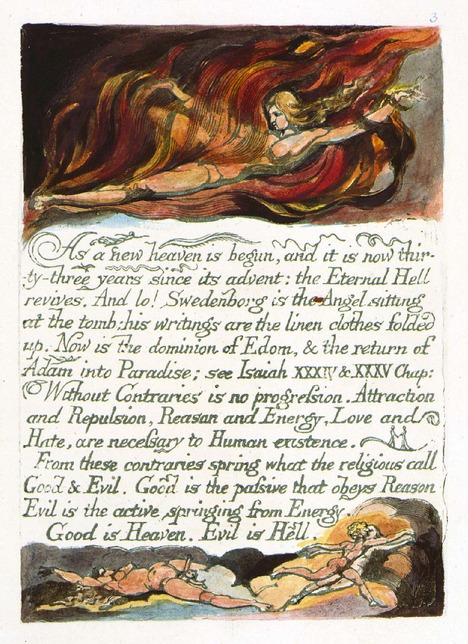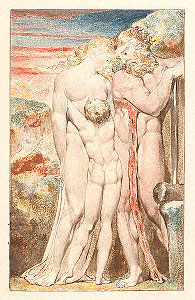First posted June 2022 |
Library of Congress Marriage of Heaven and Hell Plate 3 |
Quote from an earlier post by Larry:
"In the 18th century Emmanuel Swedenborg, the Swedish scientist, philosopher and religionist, had a very high reputation. In London a 'new church' sprang up espousing his values. William Blake's parents were members of the New Church. That probably explains several interesting things about Blake's early life. For example his father appeared to be about as permissive as the average modern father in our culture today, but very atypical for his generation.
Blake was imbued with a great many of the famous man's values, particularly his esoteric religious ones. As a young adult Blake found many of the same ideas among the great thinkers of the ages. He thus became less dependent on Swedenborg's thought forms. With MHH Plates 21 and 22 he declared his independence of his childhood teacher.
Marriage of Heaven and Hell, (E 42)
"Plate 21
I have always found that Angels have the vanity to speak of
themselves as the only wise; this they do with a confident
insolence sprouting from systematic reasoning:
Thus Swedenborg boasts that what he writes is new; tho' it
is only the Contents or Index of already publish'd books"
Plate 22
"Now hear a plain fact: Swedenborg has not written one new
truth: Now hear another: he has written all the old falshoods.
And now hear the reason. He conversed with Angels who are
all religious, & conversed not with Devils who all hate religion,
for he was incapable thro' his conceited notions.
Thus Swedenborgs writings are a recapitulation of all
superficial opinions, and an analysis of the more sublime, but no
further."
Perhaps the chief objection of the mature Blake was that Swedenborg had a positive demeanor re the established church. But one of the things that stayed with Blake was Swedenborg's concept of the Divine Humanity."
____________________
Here is a section of An Interview Conducted with Kathleen Raine on July 12, 1993 by Donald E. Stanford:
interview
"Stanford: Why did he leave the Church of the New Jerusalem?
Raine: Ah, that’s a good question. He wasn’t a churchman really. But he remained to the end of his life a Swedenborgian. This is this much-disputed Blake system. The scholars all scratch their heads about this; but it’s no problem. If you read the “Everlasting Gospel,” which is one of his latest works, it is in fact a point-by-point summary of the five leading beliefs of the Swedenborgian Church of the New Jerusalem, and in his interviews with Crabb Robinson, Robinson asked him about Swedenborg, and Blake said that he was a sent and inspired man, and then added, “but sometimes inspired men go beyond their commission from God.” He followed the Swedenborgian teaching. In fact, we’re all deeply familiar with the phrase “Divine Humanity,” but this phrase is not Blake’s invention; this is Swedenborg. And the Grand Man of the heavens, the one in many, and many in one, of all human souls — this is Swedenborg, and Blake uses this concept in a very beautiful passage in the Four Zoas in which he talks about man contracting our exalted senses with the multitude and expanding what we hold as one, as one man, all the universal family. Swedenborg’s greatest idea, I think, was this of the one in many, and many in one, and the divine presence in man. It was a really very wonderful idea because for him, the Divine Humanity was the eternal Christ, not the historical Christ. That was the Divine Humanity of whom Blake speaks and writes and speaks of as “Jesus the Imagination.” This is purely Swedenborgian. He disagreed with Swedenborg only in one respect: He said Swedenborg put all the good in heaven and the sinners in hell and didn’t realize that both the good and the evil are included in the Divine Humanity who transcends good and evil. That is what The Marriage of Heaven and Hell is about. Point-by-point, it’s quite a funny book. It takes up Swedenborg and his memorable experiences—it’s a running discussion with Swedenborg in semi-satirical terms, but although he poked fun at Swedenborg in certain respects, nevertheless, his system is pure Swedenborgian. I’m sure the only reason why everyone doesn’t know this is that the works of Swedenborg are so boring to read that none of the academics have read them, and I don’t blame them."
Descriptive Catalogue,(E 544)
"Reasons and opinions concerning acts, are not
history. Acts themselves alone are history, and these are
neither the exclusive property of Hume, Gibbon nor Voltaire,
Echard, Rapin, Plutarch, nor Herodotus. Tell me the Acts, O
historian, and leave me to reason upon them as I please; away
with your reasoning and your rubbish. All that is not action is
not [P 45] worth reading. Tell me the What; I do not want you to
tell me the Why, and the How; I can find that out myself, as well
as you can, and I will not be fooled by you into opinions, that
you please to impose, to disbelieve what you think improbable or
impossible. His opinions, who does not see spiritual agency, is
not worth any man's reading; he who rejects a fact because it is
improbable, must reject all History and retain doubts only."
Annotations to Reynolds,(E 658)
"The Ancients did not mean to Impose when they affirmd
their belief in Vision & Revelation Plato was in Earnest.
Milton was in Earnest. They believd that God did Visit Man
Really & Truly & not as Reynolds pretends"
Marriage of Heaven and Hell, Plate 3, (E 34)
"As a new heaven is begun, and it is now thirty-three years
since its advent: the Eternal Hell revives. And lo! Swedenborg is
the Angel sitting at the tomb; his writings are the linen clothes folded up.
Now is the dominion of Edom, & the return of Adam into
Paradise; see Isaiah XXXIV & XXXV Chap:
Without Contraries is no progression. Attraction and
Repulsion, Reason and Energy, Love and Hate, are necessary to
Human existence.
From these contraries spring what the religious call Good &
Evil. Good is the passive that obeys Reason[.] Evil is the active
springing from Energy.
Good is Heaven. Evil is Hell."
Milton, Plate 22 [24], (E 117)
"O Swedenborg! strongest of men, the Samson shorn by the Churches!
Shewing the Transgresors in Hell, the proud Warriors in Heaven:
Heaven as a Punisher & Hell as One under Punishment:
With Laws from Plato & his Greeks to renew the Trojan Gods,
In Albion; & to deny the value of the Saviours blood.
But then I rais'd up Whitefield, Palamabron raisd up Westley,
And these are the cries of the Churches before the two Witnesses'
Faith in God the dear Saviour who took on the likeness of men:
Becoming obedient to death, even the death of the Cross
The Witnesses lie dead in the Street of the Great City
No Faith is in all the Earth: the Book of God is trodden under Foot:
He sent his two Servants Whitefield & Westley; were they Prophets
Or were they Idiots or Madmen? shew us Miracles!
Plate 23 [25]
Can you have greater Miracles than these? Men who devote
Their lifes whole comfort to intire scorn & injury & death
Awake thou sleeper on the Rock of Eternity Albion awake
The trumpet of Judgment hath twice sounded: all Nations are awake
But thou art still heavy and dull: Awake Albion awake!"
Descriptive Catalogue, (E 546)
"The spiritual Preceptor, an experiment Picture.
THIS subject is taken from the visions of Emanuel Swedenborg.
Universal Theology, [P 53] No. 623. The Learned, who strive to
ascend into Heaven by means of learning, appear to Children like
dead horses, when repelled by the celestial spheres. The works
of this visionary are well worthy the attention of Painters and
Poets; they are foundations for grand things; the reason they
have not been more attended to, is, because corporeal demons
have gained a predominance; who the leaders of these are, will
be shewn below. Unworthy Men who gain fame among Men,
continue to govern mankind after death, and in their spiritual
bodies, oppose the spirits of those, who worthily are famous;
and as Swedenborg observes, by entering into disease and
excrement, drunkenness and concupiscence, they possess
themselves of the bodies of mortal men, and shut the doors of
mind and of thought, by placing Learning above Inspiration, O
Artist! you may disbelieve all this, but it shall be at your own
peril."






